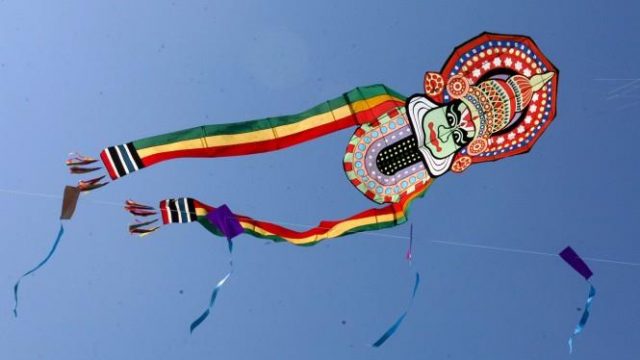Across North India, in mid-January, as the days begin to lengthen and the sun shines brighter, people celebrate the waning of winter in the form of Makar Sank-ranti. In Gujarat, this festival is known as Uttarayan, a combination of two Sanskrit words ‘uttar’ or north and ‘ayan’ or movement. Celebrated on January 14, this festival marks the northward journey of the sun. In Gujarat the festival is an excuse for families to get together and congregate on the terraces of their homes and indulge in some spirited kite flying.
However, I see little evidence of this festive spirit as I drive into Ahmedabad from the airport. The streets are quiet and the city still in slumber but torn kites dangle from buildings and power lines and flutter about in the morning breeze — evidence of last evening’s kite fights. I am on my way to Arts Reverie, a heritage guesthouse set in a pol (enclosed neighbourhood) in the old city. As we turn away from the main road, the streets suddenly shrink, then twist and turn to become a confusing muddle. But thankfully the driver knows his way and drops me beside a bright multi-coloured temple. Arts Reverie rises proudly opposite, among the crumbling havelis that flank its sides.
Even as I have breakfast I can hear excited voices from the nearby house and then someone starts playing a Bollywood number at high volume. The day’s kite flying has officially begun and I quickly head up to the terrace. Arts Reverie is taller than most of the surrounding havelis, so I have an excellent view. I watch a young boy launch a kite from the adjoining haveli, his father providing a continuous stream of advice in Gujarati. The scene is repeated on most terraces. Fathers, brothers and sons launch the kites, but it is a sedate affair so far. Inside Arts Reverie, guests begin arriving. A trio of Kutchi musicians serenade the guests. Chirag, the manager, joins me for a session of kite flying on a second, higher terrace. He launches one kite after another, but they’re promptly laid low by a rival flown from a neighbouring terrace. Chirag is using a thin roll of thread, which will not harm birds, but the others are using either thicker twine or the deadly manja — thread covered with powdered glass.
The guests are an almost equal mix of foreigners and locals. Some of the foreigners are guests at the haveli, others stay in different hotels in the city but have come here to experience kite flying in the old city. It is only after lunch that the action begins to heat up. The din has increased, almost drowning out the Bollywood songs blaring from stereos all over the pol.
This time I go up determined to try my hand at kite flying. Both the terraces at Arts Reverie are jam-packed. The atmosphere is electric. I can see hordes of competitors on the other rooftops. I try to launch a kite but without success. There is a technique to it. It should be nose up when it catches the wind, for it to fly. Dinesh, the photographer, launches the kite and hands the thread to me. I can feel the wind tugging at the kite. I loosen my hold on the string and the kite soars. I feel the wind slacken and reel in the twine a bit, the wind picks up again and the kite soars once more. And then a killer kite comes from nowhere and cuts off my kite. Dismayed, I see it float away. It’s Dinesh’s turn at the kite. The surging crowds on the terraces are screaming and roaring. Kites are being launched almost continuously and getting cut as quickly. Bloodcurdling cries accompany each fall. No genteel kai poche here. It is almost like witnessing a battle and in fact it is a war out here. Then it’s my turn again. I keep my eyes peeled for the enemy. I feel a sharp pull and immediately tighten my hold in response. I pull the twine almost blindly and see the other kite fly away. As I shout in glee I feel another tug and my own inky blue kite soars away and is lost among the hundreds of other kites that crowd the twilit sky.
Arts Reverie offers a kite flying experience on Uttarayan each year.
Tariff: Rs 500 (includes food and kites);
079-32521926, www.artsreverie.com




